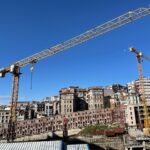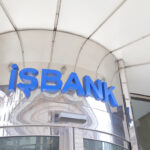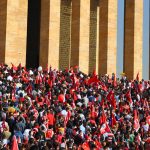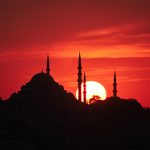October 11, 2022
Introduction
President Erdogan has made headlines this year by opening Turkey’s doors to sanctioned Russian oligarchs and refusing to impose sanctions on Russia along with fellow NATO members. However, less attention has been paid to the deeper business ties between Russian and Turkish oligarchs and what this entanglement tells us about the operating principles behind both Putin’s and Erdogan’s regimes: in both cases, as detailed in Part One of this report, oligarchy plays a crucial role in sustaining autocracy.
Russia’s and Turkey’s oligarchs are intertwined in a network of questionable financial connections that take advantage of the leniency they enjoy from their presidents. The countries have even considered joining their already controversial public wealth funds, which function similarly as parallel government slush funds reserved for rewarding the regimes’ allies. These connections economically defraud the Turkish and Russian people, while oligarchs’ amassed wealth has enabled a precipitous erosion of human rights. Oligarchy also allows Russia to influence Turkey away from its traditional allies: Russia-connected Turkish oligarchs can function as mouthpieces for pro-Russian sentiment while Erdogan continues to play both sides of major geo-political crises like the war in Ukraine.
Russian Flight to Turkey in 2022
Russian oligarchs started fleeing for Turkey as soon as international sanctions began to encircle their assets.
The Turkish economy is suffering along with the rest of the world from inflation, supply chain issues, and rising energy costs. Turkey’s inflation is further exacerbated by Erdogan’s personal economic dogma, which motivates him go use his undue influence at the central bank to continue to cut interest rates despite rising inflation. As a result, inflation is currently at over 83%, a 24-year high, and food prices have risen 93% year-on-year. The toll this takes on everyday citizens has detrimentally affected Erdogan’s popularity ahead of the coming election, making Russian direct investment an appealing prospect.
Turkey has begun offering Russians its citizenship by investment scheme, which provides a Turkish passport within three to four months to anyone willing to invest at least $250,000 in real estate or $500,000 in government bonds, companies, investment funds or a local bank account. Currently, Russians make up the majority of international real estate buyers in Turkey, with over 5,800 homes bought this year. TDP has estimated that $2.29 billion worth of Russian oligarchs’ yachts have arrived in Turkey in the past few months.
The more prominent of the oligarch-owned yachts that have entered Turkish waters include Dmitry Kamenshchik’s Flying Fox, worth $400 million, fleeing from the Dominican Republic; Vladimir Strzhalkovsky’s Ragnar, worth $85 million, fleeing from Norway; Alexander Abramov’s Titan, worth $100 million; and Roman Abramovich’s 4 yachts worth more than $1 billion, and Eclipse, worth $700 million, both fleeing Spain. Most recently, Leonid Mikhelson’s $150 million Pacific moored in Marmaris after sailing “dark” for two weeks, in violation of maritime law. Flocking to luxury resorts in Marmaris, Bodrum, Antalya, and Güvercinlik, Russian yachts have been careful not to enter EU waters while traveling around Turkey.
Turkey offers Russians its citizenship by investment scheme, which provides a Turkish passport within three to four months to anyone willing to invest at least $250,000 in real estate or $500,000 in government bonds, companies, investment funds or a local bank account.
The Role of Turkish Oligarchs in Erdogan’s Pro-Russian Diplomacy
Since the invasion of Ukraine by Russia on February 24, 2022, the Turkish president has positioned himself as a primary mediator between Russia and Ukraine, leading early but eventually unsuccessful ceasefire talks. Erdogan initially condemned Russia for its aggression against Ukraine, but has also refused to impose sanctions, negotiated another S-400 purchase, and threatened to block the expansion of NATO to Sweden and Finnland. Erdogan’s public explanation for this last move is that the Nordic countries have harbored Kurdish “terrorists.” While this explanation plays well with Erdogan’s base, it also allows the Turkish President to support Putin for personal-political and financial gain.
One crucial strategy for Erdogan in navigating this relationship is the diplomatic and financial support that Turkish oligarchs can give Russia while providing safe harbor for Putin’s own proxies. Erdogan places pro-Russian sentiments into oligarchs’ mouths while encouraging them to put Turkish wealth into Russian projects, thereby sending a signal to Moscow without compromising his image with the western world.
TDP’s research profiles two particularly prominent oligarchs whose connections with Russia have been useful to the Turkish president. TDP has also uncovered a number of Russian and Turkish oligarchic business connections.
Erman Ilicak
President of Rönesans Holding and, according to Forbes, ranked first among the 100 wealthiest Turks in 2019, Erman Ilicak begain building his $2 billion fortune after a meeting with Putin in 1994, when he was deputy mayor of St Petersburg. IIicak was a civil engineer looking to start a construction company. He met with Putin, who liked to meet companies’ decision makers, and recalls that “He [Putin] asked me: ‘Why a construction company?’ I told him I was a civil engineer and he said: ‘We definitely need small companies in this city.’ The conversation initiated a relationship that would turn Ilicak into one of the most prominent businessmen in the region.
Since then, Ilicak has built up a formidable business empire, and has benefited greatly from his close relationship with President Erdogan. While growing his empire in Turkey, Ilicak has also maintained his intimate connection to Russian business interests.
In 2018, Ilicak voiced support for a $1 billion joint wealth fund between Turkey and Russia. Praising the Russian Direct Investment Fund (RDIF) as “the world’s most successful investment fund,” Ilicak said “We have invested $1.8 billion so far in real estate in Russia. With this deal, we will now invest another $3.8 billion. For the RDIF, this is a first. We have acquired the land and construction permits. Also, the RDIF will bring us together with foreign companies that want to invest in Russia.”
In 2019, Rönesans signed a $1 billion dollar contract with the RDIF to build hospitals and medical research units across Russia. The US has stated that while officially a sovereign wealth fund, “RDIF is widely considered a slush fund for President Vladimir Putin and is emblematic of Russia’s broader kleptocracy”. The most recent investment between RDIF and the Turkish government was for the production of the Russian Sputnik V Vaccine in April of 2021. The fund is now sanctioned by the US, UK and EU in the wake of the war in Ukraine.
Beyond the RDIF, Ilicak has business entanglements with numerous now-sanctioned Russian individuals and entities. In 2018, Rönesans announced that it had signed agreements with Sberbank, which has been sanctioned in response to Russia’s invasion of Ukraine. In 2019, Rönesans was a contractor on a project under Yamal LNG in Sabetta, Russia. The project partners with natural gas giant Novatek and was proposed by major shareholder Gennady Timchenko. Both Timchenko and Novatek have been sanctioned by the United States since 2014, and both have been accused of evading sanctions since. In 2021, Rönesans built Russia’s highest capacity natural gas processing facility and signed a guarantee agreement for $3.5 billion with Gazprombank, which has since been sanctioned along with its chairman, Andrey Akimov.
Some of the same Russian banks with which Rönesans has signed agreements were recently exposed in the Pandora Papers: eight of their executives hold offshore accounts to stash their wealth and escape national and international taxes. The International Consortium of Journalists found that Sberbank’s CEO, Herman Gref – recently added to the US Sanctions List – used an offshore operative in Singapore to restructure a $75 million family trust tied to a tangle of offshore companies. Ilicak has used similar methods to evade at least $200 million in taxes through offshore companies in Switzerland and the British Virgin Islands.
Ethem Sancak
Ethem Sancak is a prominent Turkish businessman and a close ally of President Erdogan’s. Currently, Sancak maintains close contacts with Russia and is probably responsible for Erdogan’s dialogue with Moscow. Sancak makes regular public statements in support of the Kremlin and in opposition to Turkey’s NATO allies. He has travelled to Russia many times and is an active supporter of stronger ties between Russia and Turkey.
In March 2022, Sancak appeared on a Russian business news channel RBC to argue that NATO is the main culprit in Ukraine, calling the transatlantic alliance a “cancerous tumor” in the Turkish body politic. He also echoed Kremlin talking points that presented NATO action against Russia as a threat to Turkey: “We will not join in the sanctions, because if Russia falls, Turkey will get divided. And if Turkey falls, the same goes for Russia.”
Sancak maintained Turkey did not know that Bayraktar drones would be used against Russia while selling them to Ukraine. Sancak has also said that the Turkish people continuously elect Erdogan “because he fights the West and NATO.”
On another occasion, he compared Putin to Alexander the Great, stating: “This month, Putin struck the blind knot, as Alexander did. He started the process of organizing the East for the service of humanity by claiming its own past and history.” He also said the Ukrainian people were sacrificed by the Atlantists [the West and NATO].
Sancak often depicts the main menace to Turkey and Russia as emanating from the West. In an interview with Russian news outlet Octagon, Sancak described himself as Erdogan’s friend and associate. He praised Turkey’s connections to the Russian defense industry, stating that “both the Turkish people and the Turkish army have great confidence in Russian weapons.” Sancak also reassured Russia that Erdogan would purchase the second batch of Russian S-400 anti-aircraft missile systems “despite America’s threats,” and mentioned a potential joint Russian-Turkish production and sale of the S-500.
Sancak is also one of many oligarchs who has helped Erdogan’s media takeover, take control of the media and of businesses bearing strategic importance to Turkey’s economy. One of these is BMC, which is slated to produce the Altay: Turkey’s main battle tank. BMC has been implicated in dubious dealings since the ownership of the company passed to the hands of Sancak. Furthermore, Sancak is one of the sponsors and founders of Akademi Sancak, a private military academy and company. Firms like this allow Erdogan to carry out shadowy foreign policy, including making and maintaining contacts with terrorist organizations.
Russian Oligarchs in Turkey
| Oligarch | Title | Sanctions | Net Value | Yacht(s) Value |
| Dmitry Kamenshchik | Chairman of Moscow’s Domodedovo airport | US sanctions over accusations of money laundering and arms trafficking | $2.2 billion | $400 million |
| Vladimir Strzhalkovsky | Former KGB Lieutenant Colonel | N/A | $400 million | $85 million |
| Alexander Abramov | Chairman of Evraz | Australian Government | $6.7 billion | $100 million |
| Roman Abramovich | Former owner of Chelsea FC | UK Government | $8.9 billion | $1.3 billion |
| Alexander Nesis | Founder and President of ICT Group | N/A | $2 billion | $110 million |
| Andrey Molchanov | Founder and major shareholder of LSR Group | EU | $1 billion | $110 million |
| Oleg Deripaska | Founder of Basic Element | UK Government | $3.5 billion | $58 million |
| Iskander Makhmudov | Owner of UGMK | N/A | $9.4 billion | $55 million |
| Vagit Alekperov | Former President of Lukoil | UK Government | $21.8 billion | $75 million |
Russian Oligarchs with Turkish Partners
Leonid Mikhelson
Russian Companies: Novatek (Russia’s second-largest natural gas producer); Sibur (Petrochemical company)
Shares: Mikhelsonowns 25% of Novatek, and 48% of Sibur. His fortune is estimated at $26 billion and in 2017, he bought 17% of his share in Sibur company from Putin’s former son-in-law, Kirill Shamalov. Mikhelson’s Real Time Net Worth is $22.9 Billion as of 4 April 2022, making him #73 on Forbes Billionaires List in 2021.
Turkish partnership: Rönesans Holding took part in the construction of Sibur’s giant petrochemical plant. Rönesans Holding, owned by Erman Ilıcak, also took part in the construction of ZapSibNeftekhim, Russia’s largest petrochemical plant, built in the Siberia region. Sibur’s Turkey office is located in Istanbul-Levent, with approximately 26 thousand employees operating in energy, automotive, construction, FMCG, chemistry and other sectors in approximately 70 countries around the world. Mikhelson’s yacht is currently docked in Turkey.
Vladimir Potanin
Russian Company: Nornickel (the world’s largest producer of refined nickel)
Shares: 34.6% of Nornickel.
Fortune Estimate: At $27 billion dollars, Potanin has many investments in insurance, media, agriculture, and oil sector. His Real Time Net Worth is at $25.8 Billion, making him #55 on the Forbes Billionaires List in 2021.
Born in Moscow, Potanin attended primary school at the Soviet Embassy in Ankara. His father took part in the İzmir Aliağa Refinery project as part of the economic cooperation between the two countries. Potanin’s nickname is “the Oligarch from Ankara.” He is on the “Putin’s inner circle” list issued by the U.S. Treasury and is Putin’s “hockey friend.”Turkish Partnership: In 2021, Winter Capital Partners, of which Potanin’s company “Interros” is the biggest investor, bought a 35 million dollar share of Getir, which was founded in Turkey by Nazım Salur. The latter’s company Getir also has an office in London.
Vagit Alekperov
Russian Company: Lukoil is the largest independent oil company and third-largest oil company in Russia after Sberbank and Rosneft.
Shares: Alekperov owns 28.3% of Lukoil’s shares. The company, which has over 100 thousand employees, generated $72 billion in revenue in 2020. The fortune of the 71-year-old oligarch is estimated at 10.5 billion dollars. He Acquired Akpet in 2008 and his Real Time Net Worth is $21.3 Billion as of 4 April 2022, making him #81 on the Forbes Billionaires List in 2021.
Lukoil entered the Turkish market in 1998 and purchased the fuel company Akpet in 2008 for approximately 555 million dollars. As of 2022, the company has a market share of approximately 5 percent and nearly 600 fuel stations in Turkey under the names Lukoil and Akpet. Alekperov has close ties with the Azeri billionaire Mubariz Mansimov. The latter’s ties with Lukoil date back to 2006. Mansimov was implicated in criminal dealings with Erdogan and his son Bilal as well as with Erdogan’s cronies. It was alleged that Alekperov bought The Edition Hotel in Istanbul Levent in 2015 from Mubariz Mansimov.
Vladimir Lisin
Russian Company: Novolipetsk Steel, Russia’s largest steel producer; Freight One (rail freight company), UCLC Port, and VBTG (shipping company). His Real Time Net Worth is $23.8 billion as of 4 April 2022, making him #59 on Forbes Billionaires List in 2021.
Novolipetsk Steel’s 20% of exports are to Turkey. The company opened its office in Turkey in 2017.Turkish partnership: Ankara granted permission to three Russian steel producing companies, including Novolipetsk, to operate in Turkey in 2015 (as indemnification to Russia over the shooting down of the Russian Su-24 aircraft by Turkish pilots. In 2015, Turkey received the largest share of Russia’s steel exports at 20 percent.
Alexey Mordashov
Russian Company: Prior to March 2020, Mordashov was on the board of the German and British TUI Group: a travel and tourism company. He quit the TUI Group border following the Russian invasion of Ukraine. He is also the main shareholder of Severstal (a large steel and mining company.)
Shares: 30% of TUI Group.
Fortune Estimate: $30 Billion.
His Real Time Net Worth is $19.4 Billion as of 4 April 2022, making him #51 on the Forbes Billionaires List in 2021.Turkish Partnership: TUI Group owns luxury hotels in Turkey: TUI Blue Grand Azur (Marmaris), TUI blue Pascha Bay (Alanya), TUI Blue Palm Garden (Antalya-Side), TUI Blue Sarigerme Park (Mugla), TUI blue Seno (Mugla), TUI blue Tropical (Mugla), TUI MAGIC LIFE (Antalya-Belek) and TUI MAGIC LIFE (Bodrum).
Michael Fridman
Russian Company: CEO of ALFA group. The group owns Alfa-Bank, Amsterdam Commercial Bank, and the oil company TNK-BF.
Real Time Net Worth: $12.9 Billion as of 4 April 2022, #128 on Forbes Billionaires List in 2021.
Turkish Partner: Turkcell (Turkey’s second largest telecom company) LetterOne, owned by Mikhail Fridman, owns 19.8 percent of Turkcell. The company first partnered with Turkcell in 2005, when Fridman lent approximately $3 billion to the Çukurova Group to pay off its debts to the Savings Deposit Insurance Fund (TMSF).




